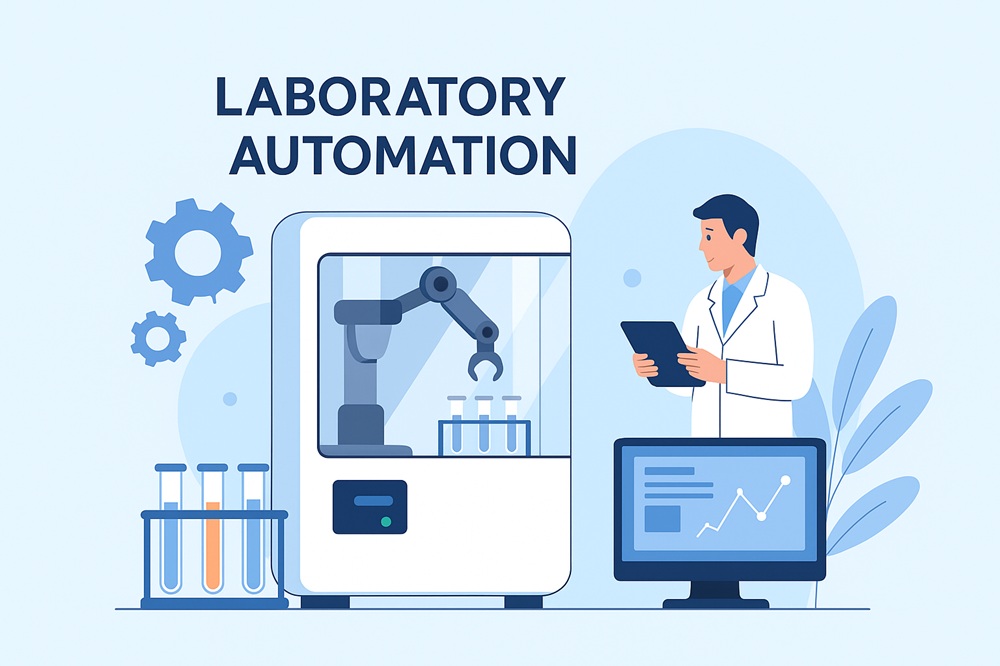The global Laboratory Automation Market is projected to grow at a compound annual growth rate (CAGR) of around 7% during the forecast period (2024–2030). The growing adoption of automation, artificial intelligence (AI), and machine learning (ML) in laboratory operations, combined with rising healthcare investments and increasing R&D activities, are key factors fueling this growth.
Automation Revolutionizing Laboratory Workflows
The Laboratory Automation Market focuses on integrating automated systems and software to perform laboratory processes with minimal human involvement. Traditionally, laboratory professionals spent considerable time on repetitive tasks such as sample preparation, testing, and data entry. Today, automation systems streamline these processes, resulting in faster turnaround times, higher accuracy, and improved productivity.
Automation enhances laboratory precision by minimizing human errors and ensuring consistent outcomes. As automation technologies evolve, even complex workflows — from drug discovery to diagnostic testing — can be automated. This shift allows laboratories to handle larger workloads efficiently while maintaining high-quality standards.
AI and Machine Learning Transforming Laboratory Management
The integration of AI and machine learning is transforming the Laboratory Automation Market, enabling laboratories to make data-driven decisions and operate more intelligently. AI algorithms help identify patterns, predict results, and automate decision-making, leading to improved diagnostic accuracy and operational efficiency.
One of the main drivers for AI and automation adoption is the shortage of skilled laboratory professionals. Many laboratories and healthcare institutions are facing staff shortages, increasing workloads, and financial constraints. By automating repetitive processes, laboratories can optimize workforce utilization, reduce burnout, and improve employee productivity.
AI-powered automation also enhances data analytics, equipment utilization, and reporting accuracy — ensuring labs can achieve greater throughput and faster turnaround times.
Economic and Operational Advantages
Automation delivers significant economic and operational benefits to healthcare systems and laboratories. It reduces manual intervention, minimizes downtime, and ensures consistent quality in testing. Automated workflows streamline logistics, improve accessibility, and optimize resource management.
The implementation of AI-driven systems in laboratory automation also enables predictive maintenance, enhances data integration, and supports remote monitoring. These efficiencies not only lower operational costs but also enable laboratories to focus on innovation, research, and patient care improvements.
Recent Technological Advancements
The Laboratory Automation Market continues to witness strong innovation from leading global players.
-
In July 2024, Inpeco launched FlexLab X, a total laboratory automation system introduced at ADLM 2024 in Chicago. Designed for enhanced flexibility and efficiency, FlexLab X integrates analyzers from multiple vendors using a unified, user-friendly interface to improve workflow performance and connectivity.
-
In July 2023, Siemens Healthineers introduced the Atellica CI Analyzer, a compact solution combining immunoassay and clinical chemistry testing. This device enhances turnaround predictability, streamlines routine lab operations, and supports safety and data security measures, addressing the growing labor shortage in healthcare laboratories.
Competitive Landscape
The Laboratory Automation Market is characterized by the presence of both established and emerging players offering a wide range of automation technologies. Major companies include Thermo Fisher Scientific, Inc., PerkinElmer Inc., Agilent Technologies, Danaher Corporation, F. Hoffmann-La Roche Ltd., Qiagen, Tecan Group Ltd., and Siemens Healthineers.
Innovative players such as Gilson Inc., BMG Labtech, Aurora Biomed, Peak Analysis & Automation, Formulatrix, and Hudson Lab Automation are redefining market dynamics with advanced automation tools and AI-integrated systems designed to meet the evolving needs of modern laboratories.
Future Outlook
The future of the Laboratory Automation Market lies in deeper integration of AI, robotics, and digital analytics. As healthcare systems continue to embrace precision medicine and data-driven diagnostics, the demand for automated laboratory solutions will grow substantially.
Automation will remain a cornerstone of laboratory transformation, offering scalability, speed, and accuracy — while helping laboratories overcome workforce shortages and operational inefficiencies. With continuous technological progress and increasing healthcare investments, the Laboratory Automation Market is well-positioned for sustainable growth through 2030.
Request a full report and explore detailed insights:
https://meditechinsights.com/laboratory-automation-market/request-sample/

Email: mary@satprwire.com Phone: +44 20 4732 1986
Marry is a fitness freak in every manner and gives proper care about her health and of others. She is probably the best person we have at Daily Research News for covering articles from the Health sector. If not at work, she can be seen drinking a cup of coffee.
